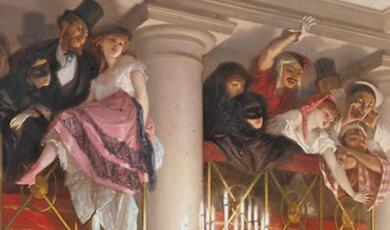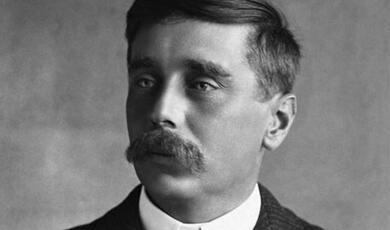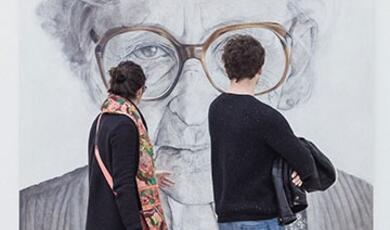West End Theatre in China
Share
- Details
- Transcript
- Audio
- Downloads
- Extra Reading
In June 2011 the first ever Mandarin language production of a first class musical opened in Shanghai to an ecstatic reaction from audiences, the Press and some might say most importantly, the Government. The Chinese version of Mamma Mia! has broken new ground, bringing London's West End to the Chinese population in their own language. As the newest world market for West End theatre what does the success of Mamma Mia! say about opportunities in China for British theatre and what does an appetite for West End productions say about modern China?
This is the third in a series of four 'Mondays at One' lectures on The Theatre in London. Other lectures in this series are as follows:
London Theatre: Past Glories, Today’s Success and Tomorrow’s Opportunities
Is Theatre History? The Alternative Explosion
The Future of London Theatre
Download Transcript
15 October 2012
The Theatre as a
Key London Industry
David Lightbody
At 7.15pm on Monday July 11th 2011 at the Shanghai Grand Theatre in China the curtain rose on a unique and groundbreaking theatre production. The first words sung were “You yi ge meng”, “I have a dream”. The show was Mamma Mia! and it was the first, first class production of a major western musical in Chinese. As Executive Producer on behalf of Judy Craymer and Littlestar for the Chinese production it was, for me, the end of two and half years of production development. However, if I include into this the years I spent before Mamma Mia! as General Manager for Cameron Mackintosh Limited in China, it was in fact the culmination of seven years of intensive work to bring a Chinese language version of a major western musical to the Chinese people. The response to that first night was almost universally positive amongst audiences, the media and the Government. 15 months later, at this moment, the production is setting up in Hangzhou, Zhejiang province in the Yangtze River Delta, the latest stop on a tour that since Shanghai has taken in Beijing, Guangzhou, Wuhan, Xian, Chongqing, Taicang, Harbin, Tianjin, Nanjing and Xining. By the end of this year we will have performed in 17 cities to well over 300,000 people and wherever the show has gone it has broken records. I am, I think rightly, quite proud of this achievement and I believe it was largely worth the long road to bring the production to the Chinese stage. The question that is often in my mind however is whether this is evidence of a great new market of unprecedented size opening up for West End theatre export or is it simply evidence of a nation emerging into a global economy where the big brand musicals of the West are temporarily desirable? Will China over the next decade become one of the most important commercial theatre markets on the planet and if so what are West End theatre producers doing to make this opportunity a new chapter in the long history of British theatre?
The export of British theatre is far from new of course; Shakespeare’s works have long been produced throughout the world in multiple languages and through the lens of many different cultures. British musical theatre has also been presented widely on foreign shores long before the advent of the late twentieth century mega musical. Gilbert and Sullivan and the D’Oyly Carte Opera Company are notable for the manner in which they developed, performed and licensed internationally successful productions. I wonder though if this spread of British theatre across the globe was not more akin to the spread of cricket through commonwealth countries rather than any sort of deliberate strategy. There is no doubt that amateur companies played a large part in bringing these works to other parts of the world and the motivations for these productions were almost certainly, cultural, social, and personal rather than commercial.
This dissemination of British theatre across the globe then is very different to the globalisation of West End theatre product that began with the mega musicals of the 1980’s and the advent of world wide first class licensing of West End productions. The basic definition of a first class reproduction of a musical or a play is a performance of that production in a first class theatre, with a first class cast, utilising the same designs as were or are being used in the original production, often under the control of the original producer and/or the original creative team. A license will be granted to a production company in the country in question and under the supervision of the original producer that production company will recreate the show as is it was first staged, but with a local cast and where necessary in the local language. In first class licensing you only change the ‘words and the wigs’ as we say. This emphasis on control and reproduction is really the core of the success of global licensing. It essentially makes the West End version of a show available and accessible to the widest possible audience without any deterioration in production quality. Cats, Les Miserables, The Phantom of the Opera, Miss Saigon, Mamma Mia! and more recently shows such as War Horse have begun on the London stage and gone on to find enormous success throughout the world. Broadway and the US touring circuit are of course the obvious first destinations outside of the UK, but since the 1980’s Japan has been a key third global market for London musicals and since then Australia, South Africa, Germany, Holland, Scandinavia, South Korea, to name a few, have all developed important commercial musical theatre markets of their own. What is interesting to note here is that the productions I have just named have found consistent global appeal amongst audiences. This can be put down to many elements, the quality of the music, the story and the design are of course critical but perhaps as important is the evident appeal of musical theatre across cultures and peoples. Perhaps people ,wherever they come from, simply enjoy a well made, entertaining, accessible, popular performance or perhaps the nature of musical theatre draws audiences more closely into the emotion and characters portrayed and as such the emotional reaction and connection with the production is more keenly felt. Or perhaps as Julian Bird from Society of London Theatres suggested in his talk in this series a couple of weeks ago, there is something aspirational about musical theatre. He described the boom in musicals in the 1980’s as growing out of an increasingly aspirational and confident Britain, I would contend that as these big shows have developed around the world and grown into global brands they have carried something of that aspiration and confidence with them. It can be no mistake that when one looks at a list of the shows which were first produced in nearly all emergent global musical markets, the titles; Cats, Les Miserables and The Phantom of the Opera are always there. The precise answer to why this tight group of West End musicals have been so successful globally would be the subject of a long debate, but the fact remains that they do enjoy this level of success and this success has made the market for West End theatre global and has made commercial theatre itself an industry that is genuinely international in its nature.
Inevitably perhaps attention has now become firmly focussed on China and whether this country might be the largest and perhaps greatest musical theatre market of the coming decades. As with so many other industries, the basic numbers in China, present commercial theatre with a hugely attractive proposition. It is easy to have a lot of fun with Chinese numbers; for everyone alive in China right now to see our production of Mamma Mia! in a 1500 seat theatre on a standard 8 show week would take 2500 years! More sensibly there are at least 100 Million people on the Eastern seaboard of China who have the disposable income to afford West End ticket prices. This has been and remains a very attractive proposition for West End producers evaluating the global market for their productions. However, China has proved, unsurprisingly, a much harder nut to crack than most other global markets and it remains a perplexing and mystifying proposition for any foreigner wanting to take advantage of the staggering potential of this market. Like other major industries in China, their Cultural Industry offer a genuine and fabulous opportunity that is extremely hard to realise.
I first travelled to China in 2000 to direct a student theatre festival at the International School of Beijing. Thinking back I only remember bicycles, an empty Great Wall on a cold but bright winter morning and the Forbidden City where our blonde haired female students were photographed by intrigued tourists from the interior. This was only twelve years ago and my experience is as nothing in comparison to those who were old China hands from before the war or were part of the International community living in Beijing in the 1950’s and 60’s as my wife’s grandparents and mother were. But still when I go to China today, as I do seven or eight times a year I cannot believe the change. The bicycles have largely gone, the Great Wall never seems to be empty and a blonde haired girl is nothing special anymore.
My real relationship with China however began in 2005 when Sir Cameron Mackintosh sent me to China to explore opportunities for producing Chinese language versions of his musicals there. Since 2002 touring versions of major western musicals had been presented in English largely under the influence of the Artistic Director of Shanghai Grand Theatre, Mr Qian Shijin. He was and still is a lover of musicals and he succeeded in working with Cameron Mackintosh to bring the US touring version of Les Miserables to the Shanghai Grand Theatre for 24 performances in the Summer of 2002. This was the first full length western musical toured into China and is really in my opinion the beginning of the modern musical industry in China. I wasn’t there but it is spoken of as a very special experience, there were a lot of tears and on the last night a young local girl was allowed to play the young Cosette and sang ‘Castle On A Cloud’ in Mandarin. Les Miserables has a very special place in Chinese hearts. Victor Hugo was a great friend of the Chinese people and the story is well known in China. When I had the chance to meet with Premier Wen Jiabao a few years ago here in London I asked him about a possible Chinese version of Les Miserables and he told me that this was an important story for the Chinese people, that any country that abandoned their poor would never know peace and harmony. It is one of the greatest goals in my life to produce Les Miserables in Mandarin with a Chinese cast, I have been working on it for seven years now and I don’t intend to give up on that goal, but I might need some years yet.
I worked in China for Cameron Mackintosh between 2005 and 2009, learning about the country, it’s entertainment sector and the opportunities that might exist to create commercial theatre there. When I first arrived in China what we were thinking of doing was still illegal, in the sense that foreign involvement in producing for the Chinese stage was not permitted. It was one of the first key indicators of genuine change when shortly after my arrival this law was changed to allow for participation by non-Chinese companies. Beyond the legality of what I was doing the other four key questions on my mind during this time were; Is there a market for musicals in China? Is there the talent to deliver first class musicals in China? Are there appropriate theatres for musicals in China? And can we find an appropriate local producing partner in China?
Firstly, in relation to the market the answer was becoming more and more clear. After Les Miserables was performed in English in 2002 a steady stream of English language tours of first class musicals were presented in Shanghai and Beijing, including The Phantom of the Opera and Lion King which both ran for 3 months in Shanghai and Cats which has since completed 3 tours of China and this summer opened in Chinese as the second first class musical to be produced in the language. The increasing appetite for musicals amongst the populations of Beijing and particularly Shanghai was evident; one cannot overstate how unique it was for a show to run for 120 performances in one theatre in China when 5 or 6 performances was usually thought of as a long run. Evidence therefore was growing that Chinese audiences enjoyed musicals in English, the question this begged was would they like them equally in Chinese. Experience for developing musical markets around the world is that where the first language is not English the local language of that country should be used. I have often heard Cameron Mackintosh speak on this point and I am convinced his approach is correct, that in the local language the musicals have a much better chance of becoming an integral part of the local theatre industry, rather than being simply a foreign import of temporary interest. Ultimately if a story is told in one’s own language it is easier to relate closely to the characters on stage and their story so the emotional connection is much higher. A genuinely strong commercial musical theatre industry has at its heart long running, continuously popular shows, this longevity of run is much harder to achieve if the production is not in the local language. I received a lot of resistance to this idea from some people in China who felt that Chinese audiences would only want to see a show in its original language, that somehow this was the ‘proper’ way to experience the show. There is of course some argument to support this in opera but musicals are different animals and the way the audience experiences a musical is different. I think this approach would also put musicals in the bracket of fixed recorded performance, which does not suit it well. A live musical is not the final released edit of a film, or an album or a painting, at its best it is a first night every night with the same energy and dynamism, but if it is in a foreign language it becomes something to observe as a kind of foreign artefact rather than something to fully experience.
The second question I asked was is there enough talent in China to cast musicals to a first class level and enough technical expertise to staff a show? A number of years ago I sat down with the principal of the Royal Academy of Music to discuss talent in China and he told me that of all the countries he visits some of the very best technical singing voices are in China. In early tests casting trips to China we discovered something very similar, it seemed there was enough performing talent to cast a musical, driven largely by the new musical theatre training course being offered at major institutions such as the Central Academy of Drama in Beijing and the Shanghai Conservatory of Music and Shanghai Theatre Academy. In Autumn 2010, around 10 months before we opened the Chinese Mamma Mia! we began the casting process for the production. It proved relatively easy to cast the ensemble and the young leads but finding older actors with the qualities and abilities to play the older characters proved much harder. This is perhaps not that surprising as the musical theatre training course have only recently begun to graduate students. We ultimately did find an excellent company of actors and the actress who played our lead character was undoubtedly as strong in that role as anyone anywhere in the world. We learned two very important lessons from this casting process, the first is that it is possible to find a high quality of musical performers in China but there are not that many of them. This is a barrier to the growth of the Chinese industry but I believe it will correct itself over time as more Chinese students graduate from training courses and the musical form becomes more accepted amongst older performers. The second lesson is that even if one can find actors of the right standard it is often quite hard to actually employ them. Many high quality actors already work for and are contracted long term to companies in the state run theatre system and securing their release to perform in a musical for a long run is very hard. The concept of freelance workers in the theatre industry in China is fairly new and certainly there is nothing as yet like the open market for actors that exists in London. What is true for actors is doubly true for theatre technicians, but the Chinese themselves are very aware of this and are actively working with UK institutions and the British Council to develop theatre technicians trained in western techniques. I expect some may think that what I am saying cannot be true, surely one just has to look at the Olympic Games opening ceremony in 2008 to realise what level of performance and technical skill exists in China and I do not deny that thee is a lot of talent. However, talent that is specifically focussed on delivering commercial musical theatre is only just developing and this will take time.
My third question related to theatres and whether those available in China would be suitable for commercial musical theatre? The answer is yes and no. China has some wonderful modern theatres; the National Centre for the Performing Arts in Beijing, the Cultural Square theatre in Shanghai and the Shanghai Grand Theatre are absolutely state of the art. They work brilliantly for opera, large-scale dance and symphony orchestras but are perhaps a little less suited to drama and musicals, which ideally require a more intimate relationship between the audience and the stage. In China these theatres are often referred to as ‘Grand Theatres’ and a further 40 of these theatres will have opened across China between 2010 and 2013. Experience in the West End shows clearly that different commercial shows work better in different types of venue. A one size fits all solution does not exist. Seating capacity, location, character and other qualities, which are hard to define, will suit one type of production better than another. In China today there is an increasing awareness of this. In the 1920’s and 30’s there were more commercial theatre operating in Shanghai than either London or New York at that time. The city has a rich architectural legacy and plans are afoot to breathe life back into some of these buildings and at the same time provide diversity of theatre space, designed to a very high modern standard but with a different nature and character to the great Chinese Grand theatres. I am involved in these plans because I see it as critical to a future viable commercial industry.
My final question concerned who we should partner with in China? The new laws regarding theatre production in China and the involvement of foreign parties stipulated that any Sino-Foreign production company must be majority owned by the Chinese partner. Even without this law though I cannot imagine ever attempting to produce in China without a strong Chinese company working alongside me. Over the years we were approached by a number of potential partners to produce the Chinese version of Mamma Mia! but in the end we decided to work with the China Arts and Entertainment Group. CAEG, as they are commonly called, are the commercial wing of the Ministry of Culture. The decision to work with CAEG was in the end a fairly simple one as a Government entity they were ultimately prepared to take the risk on producing a commercial musical and provide the money, resources and influence to make it a reality. Anyone who has produced a play or a musical professionally knows it carries a very large degree of risk. Even in as sophisticated a market as the West End the risks of failure are high. Finding a partner who was willing to take a chance on that failure in China was not easy. CAEG however created a new Joint Venture production company called United Asia Live Entertainment with the primary purpose of kick starting the Chinese musical industry. Behind this lay the requirement in the Government’s Five Year Plan to move Cultural Industry from an ‘Emergent Industry’ to a ‘Pillar Industry’ in the Chinese economy. This is an increase from being responsible for 2.5% of GDP to 5% of GDP, a major task. Commercial theatre has an important role to play in this and as such the risk/reward analysis of producing Chinese musicals altered and a chance was taken with Mamma Mia! The influence of the current Five Year Plan in turning the dream of a Chinese musical industry into a reality should not be underestimated.
As I said at the beginning of this lecture the Chinese version of Mamma Mia! has been a great success, audiences have responded with huge enthusiasm and I anticipate the production will continue to run each year for at least the next 5 years. The Chinese production of Cats is also being well received. On that opening night in July last year all of the UK production team who worked on the show concluded that the Chinese production was as good as anywhere else in the world and that it succeeded in pulling off that remarkable trick of being a story about English characters on a Greek island with songs by a Swedish super group and yet somehow feeling like it was a Chinese story. Whilst the UK and Chinese teams working together made the production work, this should not mask the issues that the Chinese market faces in terms of theatres, performers, technicians, producers, and marketers; it should not mask just how new, how emergent the Chinese industry is. It has often struck me that I spend all my time flying between the oldest commercial theatre market in the world here in London and the newest commercial theatre market in the world in China. Last week I visited the British Museum to see the ‘ Shakespeare: Staging the World’ exhibition. Amongst many wonderful artefacts was a poster from the early 17th Century for a bear baiting event to take place on the south bank near the Globe theatre. Philip Henslowe was the theatrical producer responsible for the event and the slightly dull looking, wordy poster struck a chord with me. It reminded me just how incredibly sophisticated West End theatre has become over 400 years. The ever growing audience numbers, the thousands of high quality actors available to work on freelance contracts, the broad selection of different types and sizes of venues, the multiple producers and investors willing to take risk and the writers developing new ideas. Not to forget the specialist theatre marketing companies presenting ever more sophisticated ways of reaching an audience, sharing a common goal with Philip Henslowe but vastly more sophisticated. In the Chinese industry all of these things are just beginning. Or perhaps I should qualify that, China has a long and vibrant history of the performing arts, China is not at the beginning of its theatrical history, far from it, but in the modern China just opening up to the modern world the commercial theatre industry is brand new. And West End theatre does have a role to play. I believe the Chinese authorities have recognised the quality and sophistication of the world’s oldest theatre market and they are reaching out for help to support their fledgling industry. There are opportunities for companies involved in every aspect of the UK theatre industry to engage with China, it will not be easy, but some of that great Chinese opportunity is real and available, now is the time to go and be part of it.
It is, however, not the whole story. There are three stages to the Chinese plan for musicals. Stage one was to import English language versions of major western musicals, stage two is to localise those major titles into Chinese thereby offering opportunities for an indigenous musical industry to develop. Stage three will be for original Chinese musicals to play across the world with the West End stage being the ultimate destination. This too will be far from easy. Nearly all of the really major hits of recent decades, the billion dollar grossing musicals originated in London, the oldest most sophisticated theatre market of them all. Can China in a matter of decades produce a creative, cultural environment where a truly global musical can emerge? Possibly and I for one am not going to bank against it. I have watched closely and first hand the progress that has been made since I stepped off that plane 12 years ago in Beijing and progress will continue, problems will be solved and the dream of a global Chinese original musical on a West End stage will endure. They have a goal; they have a dream – “Tamen you yi ge meng!”
© David Lightbody 2012
Part of:
This event was on Mon, 15 Oct 2012
Support Gresham
Gresham College has offered an outstanding education to the public free of charge for over 400 years. Today, Gresham plays an important role in fostering a love of learning and a greater understanding of ourselves and the world around us. Your donation will help to widen our reach and to broaden our audience, allowing more people to benefit from a high-quality education from some of the brightest minds.


 Login
Login







